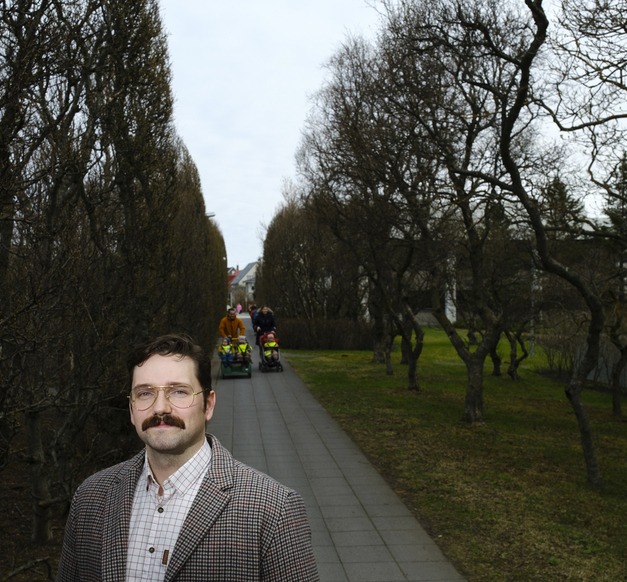
"Haven't we all at one time or another asked ourselves questions like: Do I really get as much back from the contributions I make to society as the person next to me? How does my socioeconomic background affect my success in life? This project is my way of trying to find some answers to questions like these," says PhD student Emil Dagsson, who is using methodology from the field of economics to shed light on opportunities for people to make a better life for themselves within Icelandic society.
"The goal of my research is to measure the privilege experienced by different social groups, as well as evaluating to what extent equal opportunities exist in our society. To do this, I am evaluating social mobility between generations in Iceland, the main factors being education and income. These things tell us how the socioeconomic status of parents can affect their children," explains Emil.
Educational mobility higher than in many other European countries
Emil first became interested in this subject as an undergraduate. His BS thesis, which later become a paper in the journal Stjórnmál og stjórnsýsla, uncovered a statistical link between parents' level of education and their children's level of education. "The results of my analysis showed that intergenerational educational mobility is higher in Iceland than in many other European countries, although lower than the other Nordic countries. This means that in Iceland, a child with parents who have little education has a greater chance than in many other places of attaining a higher level of education and thereby accessing more opportunities in life. However, we do need further research in this area. This is what motivated me to make this the topic of my PhD project," says Emil.
Emil's research interests are largely focused on statistical analysis of socioeconomic status and financially-based decisions, with the aim of better understanding human society. "My Master's thesis was actually about evaluating the debt burden on different socioeconomic groups in Iceland," says Emil, who has also put a lot of effort into sharing information on economic issues through various platforms. For example, he was involved in founding Fjárráð, an association of economics students aiming to improve financial literacy among university students. He also hosts Ekon (https://soundcloud.com/kjarninn/ekon-oareifanlegur-kostnaur-ess-a-vera-f...), which is an accessible economics podcast aimed at a general audience.
"We also found it interesting that downward educational mobility was more common here in Iceland and other Nordic countries than in other countries. This refers to people who are less educated than their parents. One of the things we want to look at is whether the rates of return of education could play a role in this – if reaching a higher level of education provides a lower rate of return, could that cause higher intergenerational educational mobility?" says Emil.
image/kristinn ingvarsson

Exploring education, income and property
For his PhD, Emil is continuing to investigate the statistical relationship between parents' level of education and their children's level of education, but also the relationship between parents' and children's lifetime income. "These things give us an idea of how the socioeconomic status of parents can affect their children, if we assume that education and income do indicate socioeconomic status," explains Emil, adding: "I am also planning to expand the analysis by looking at other variables, such as property and employment, as the research progresses."
Emil's research is mainly based on data from Statistics Iceland, linking tax data to other sociodemographic variables such as education. "However, it is always a challenge in research like this to make sure you aren't comparing apples and oranges. You have to evaluate the impact of certain factors whilst being careful to keep other variables constant. One way to get closer to uncovering true causation is by working with so-called auxiliary variables. We have a few of these in mind and are planning to explore them in more detail," says Emil, referring here to his colleagues on the project: his supervisor Gylfi Zoëga, professor of economics; Arnaldur Sölvi Kristjánsson, economist at the Icelandic Confederation of Labour; Kolbeinn Hólmar Stefánsson, senior lecturer at the UI Faculty of Social Work; and Helgi Eiríkur Eyjólfsson, PhD student.
Does the rate of return of education affect educational mobility?
Emil says that the research is still in the early stages and so no results are available yet. However, the team's earlier research has revealed that educational mobility in Iceland is higher than the European average, but lower than in other Nordic countries. "We also found it interesting that downward educational mobility was more common here in Iceland and other Nordic countries than in other countries. This refers to people who are less educated than their parents. One of the things we want to look at is whether the rates of return of education could play a role in this – if reaching a higher level of education provides a lower rate of return, could that cause higher intergenerational educational mobility?" says Emil.
Emil says that the results of his doctoral research will reveal both how intergenerational mobility has developed in Iceland, in terms of things like education and property, and how mobility works in societies, since we know there is a strong statistical link between inequality and low intergenerational mobility. "Information like this could support the introduction and development of official regulations to combat any kind of increase in inequality, whether that be in education, income, property or opportunity," says Emil.
He adds, "High levels of upward intergenerational mobility are generally considered a positive thing and most people agree that this is a goal worth working towards. This research will give us a better understanding of how we can promote increased intergenerational mobility in Iceland. It will also be possible to compare the situation in Iceland with other countries where similar research has taken place, especially the other Nordic countries, to get a better overview of how we are doing in an international context."


